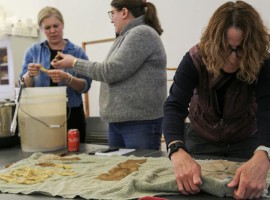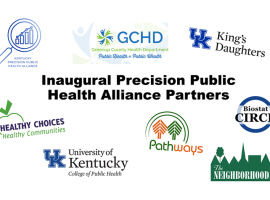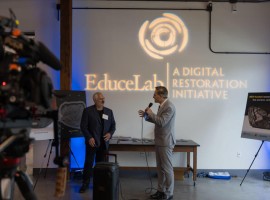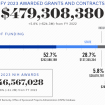Export Control with John Craddock
John Craddock joined the Office of Sponsored Projects Administration (OSPA) staff, under the auspices of the Vice President for Research, with the goal of proactively streamlining compliance for UK investigators seeking funding that may be regulated by export control laws.
Craddock has worked as a principal investigator at the Center for Applied Energy Research on several export controlled projects, where he developed protocols to remain in compliance with U.S. export control laws.
Craddock explains the importance of his new role: “I think there’s a stigma that comes with export controlled research, in that it’s scary or dangerous. It’s really not, and we want to get that message out because there’s a lot of DoD, NASA funding out there. Having been in this area for eight years now, there are a lot of opportunities to bring in new and novel research and utilize the facilities and staff we have here at UK. I think it will open up doors towards funding that investigators may not have pursued in the past because now they can feel confident and comfortable that we have a plan in place to comply.”
U.S. export control laws and regulations exist to maintain national security and protect U.S. economic vitality. These regulations control the shipment of both tangible items and technical data outside the country, and prohibit access to export-controlled technical data, materials or equipment to non-U.S. persons within the United States, known as a deemed export.
Listen to the podcast to learn what types of research fall under export control, how to protect research by developing a Technology Control Plan (TCP), and how Craddock can help investigators.
Research Support: Export Control with John Craddock - Podcast Transcript
Have you ever wondered who was doing the research that will impact your future? The research podcast lets you met those people, and learn how the University of Kentucky is exploring and strengthening our understanding of the world through research and discovery.
Here's Alicia Gregory, director of Research Communications.
Alicia: Today we’ll meet John Craddock. He works at the UK Center for Applied Energy Research and he has taken on a new role as the export control liaison in the Office of Sponsored Project Administration. His job is to help UK investigators navigate export controlled research.
John Craddock: I came in with a chemistry degree from Georgetown College. I pursued my graduate degree here at the University of Kentucky in Chemistry. Once upon graduation, I started working at the Center for Applied Energy Research, under Matt Weisenberger. I quickly realized that we were heavily involved in doing DOD-sponsored research, and we were in compliance, but no one really understood the export control laws. So, then I was tasked with learning a little bit more about export controls and how it applied to university research. And, I took several months of training and courses, and have since sort of developed a technical know-how in the area. And, since then, I've been working with OSPA, Office of Sponsored Projects Administration here at UK, to sort of help the university go towards a direction where PIs are comfortable chasing and pursuing export controlled research. This is just items and materials and technologies that our government feels are sensitive enough that there needs to be some sort of laws in place to prevent it getting in the wrong hands.
Alicia: So, let's talk a little bit first about, what are the U.S. Export Control Laws?
John Craddock: So, in general, the laws are federal regulations which control the export of certain technologies, products, and information, for strategic reasons. Such as, national security and the economic vitality of our country.
Alicia: So, what is, technically, an export?
John Craddock: Traditionally, when one thinks of an export, it's a physical export. Where you're actually putting a good or an item in a box, and mailing it somewhere. And, for export control laws to really apply in that instance, it's commonly done for a shipment out of a country. Where it actually crosses- exits the US borders.
More applicable to the university setting is what's known as a deemed export. And, this is a little bit of a misnomer, it seems, in that a deemed export actually happens within the borders of the United States. So, it is an export to a foreign national within the U.S. Commonly can happen by a site visit, letting them tour your facility, visual inspection of a controlled item. That is an export to the country of their citizenship. The same as if you mailed something to that country. So, that's-- you can imagine, slightly problematic at a university setting. Requires extra sort of controls, and, you know, few locks on doors. And, it's not impossible, it's not hard to do, you just have to be aware, and you know, due diligence is critical.
Alicia: So, how do export control laws affect research at the university level?
John Craddock: Okay, so there-- these export control laws were written at a time when they were written for industry and large commerce. However, we have learned that they do apply to universities, and specifically, they apply to the university research projects. Is most commonly how you're going to encounter them here. And, if they do apply to a research project, there are often times two restrictions that make these laws applicable to the university. The first of which is, there will be some kind of language about restrictions about publications of your work, and the results of your research. That oftentimes sort of diverts it to a controlled project. And, also there will be restrictions on the nationalities of the participants in the project. So, if you have one, or both, or a combo of the two, of those restrictions, it, by default, is now an export controlled project, and you'll need to take the proper path to ensure compliance.
Alicia: So, there are different kinds of regulations on this. There's the International Traffic in Arms Regulation and then there's Export Administration Regulations. Talk about the difference between those two, and why are there two categories.
John Craddock: The International Traffic in Arms Regulations are commonly known as-- referred to as ITAR. It's a set of regulations administered by the Department of State. Primarily controls what they call Defense Articles, or Defense Services. Mainly, military, or space, or weapons related items and technologies. It's a much more narrower list that it controls, but it is—it’s heavily centered about defense. And, the items that are controlled fall on the United States Munitions List, or the USML.
And, EAR stands for the Export Administration Regulations. These are also a set of federal regulations, but their administered, instead of by the Department of State, they come from the Department of Commerce. And, as you might imagine from the name commerce, it controls a much larger range of items. It also controls things that are what are known as dual-use items. Or an item that may have a civilian and a military end use. This has what's called the CCL, or the Commerce Control List, where it details out each item or technology and tells you to which countries you need to apply for a license if you want foreign nationals to work on these projects. And, that specifically affects us here at the university.
Alicia: So, how does a PI find out if they're involved in controlled research?
John Craddock: Initially, I'm asking that all PIs sort of contact me. If they think that they may be involved in controlled research, I will sit down with them, review their technologies and their types of research, and we can go to these lists; the USML and the CCL, and literally just look them up. And, then from there, we'll have a good feel for moving forward, plans we need to put in place to ensure compliance.
Alicia: And, when they're applying for grants, that's usually spelled out in the proposals.
John Craddock: That's right. A lot of times, you'll see it in the solicitation, you'll see it. It can be very general language. We're working with those in OSPA to also key in on this language now, and we can sit in and meet with the PIs early, even at the proposal stage. And, then again, you can see modified language or additional language once awarded, in the actual award language. So, just because it is, or is not, in the solicitation, does not mean that is going to be, or not be, in the actual award language. So, it just-- you can become cognizant that it may or may not apply based on the language in the solicitation.
Alicia: Describe for me a little bit further, your role within OSPA. And, how you're going to help PIs.
John Craddock: Currently I'm working with all of the research administrators, the College Grants Officers within OSPA, who reach out to all the colleges. When they see language comes in in their proposals, because they see all the proposals that go out, I'm being contacted, and they'll bring me in if they think export controls may apply, or if it specifically calls out export controls within the solicitation. And, then from there, I can contact the PI to have a one-on-one, sit down meeting, to go through the specific regulations and how it applies to this particular project. And, overall, we're trying to raise awareness across campus. That's been our main goal.
Alicia: So, what is the fundamental research exemption?
John Craddock: A lot of universities fall under this Fundamental Research Exemption. Universities are tasked with, do they, or do they not, want to pursue export controlled research. There are some that simply don't. Fundamental research is, by definition, basic and applied research in science and engineering, where the resulting information is ordinarily published and shared broadly within the scientific community. The techniques used during the research are normally publically available, or are part of the published information. So, that's the definition. Most of the university's research, probably 99 percent, is fundamental. However, those two clauses that we mentioned, that can kick it out of the fundamental research exemption, are if you accept restrictions on foreign nationals, or-- and/or restrict-- accept restrictions on publication of your data. And, if you do, it no longer is fundamental, which means export control laws do apply, and you need to develop the next topic we'll talk about, which is a Technology Control Plan.
Technology Control Plans are a map that details how the personnel involved in the project will comply and ensure that there is no unintended release or disclosure of the data, or the items, or the technology to foreign nationals without proper government approval. And, the technology control plan should exist for each individual project, and should detail out who is being paid on the project, those that are working on it, and above all, everyone who is working on it needs to be aware of the TCP, technology control plan, and be aware of how to comply.
Commonly you'll address physical storage of lab notebooks, and papers, and any kinds of items that may be generated during this. As well as data security, password protected computers, password protected jump drives. Please don't use external Yahoo, Gmail servers, try to keep it all within UK. But, yeah, that's all spelled out in the TCP, and it will be different for each project.
Alicia: Why has the university chosen to kind of focus in on this area?
John Craddock: The University, traditionally, has been a fundamental research institution. We are now opening it up, and allowing PIs to pursue funding that export controlled. And, not only can they pursue it, but we now have a plan in place for, once we do get awarded, we can help the PIs to be in compliance. So, they don't have to worry about any of the legal issues that may come along with it. I think, there's a stigma that comes with export controlled research, in that it's scary or dangerous. And, it's really not, and we want to get that message out. Because there's a lot of DOD funding out there that the university can get heavily involved with.
The unknown is scary. And, when people don't know what export control laws-- there's a lot of mix up between export controlled research, and secured and classified research. That's very common. And, they are very different. This is sort of the bottom level regulations and laws for export control laws, and you don't have to secure facilities like in our classified clearance, like you do at some other-- and some other universities do take part in this research, but that's not what we're doing here at the University of Kentucky.
Alicia: Looking forward, where do you see this kind of support helping PIs in terms of getting more grants in some of these areas?
John Craddock: I think the biggest impact will be, once awareness is there, folks that potentially may have been avoiding, I don't know, DOD, NASA funding, will begin to explore. And, there are a lot of solicitations out there. Having been in this area for 8 years now, there's a lot of opportunities to bring in new and novel research to the university, and really exploit some of the really nice facilities and staff we have here at UK. So, I think it will open up doors towards funding that they may not have pursued in the past, by feeling confident and comfortable that we have a plan in place to comply.
Thank you for listening to the Research Podcast. To subscribe to our podcasts on Soundcloud or iTunes, search University of Kentucky Research media and visit our site; reveal.uky.edu.





